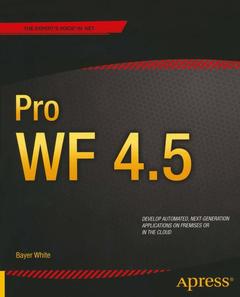Description
Pro WF 4.5, 1st ed.
Language: English
652 p. · 17.8x25.4 cm · Paperback
Description
/li>Contents
/li>Comment
/li>
In Pro WF 4.5, you'll find the insight and direction for understanding how to build workflows using WF 4.5 and host them as long-running services using Microsoft’s Windows Server, for on-premises work, and Azure AppFabric, for hosting workflows in the cloud.
With the concept of cloud computing using Windows Azure and the maturity of Windows Server technology, workflow services can be hosted with first-class service monitoring with less overhead from a developer’s perspective. Building workflows in a declarative fashion, and hosting them as services, is a natural way for building business logic that is tiered away from running applications that subscribe to them, therefore providing flexibility for when business processes change.
In Pro WF 4.5, author Bayer White walks you, as the developer, through the steps and explains the concepts of declaratively modeling domain specific business processes that can be hosted and exposed as services, either on premise or as cloud services within Windows Azure.
- Gives you a practical knowledge of WF 4.5, Windows Server and Azure AppFabric.
- Builds a foundation for building workflows that can be exposed on-premise or in the cloud.
- Shows how to use the tools available for managing workflow services.
Why Workflows?
Introducing Windows Workflow Foundation
Workflow Activities
State Machine Workflows
Flowchart Workflows
Dynamically Changing and Versioning Workflows
Patterns for Hosting Workflows
Persisting Workflows
Tracking Workflows
Re-hosting the Workflow Designer
Stateful WCF Services Using Workflows
Workflows in Azure
Workflows in Windows Server AppFabric




